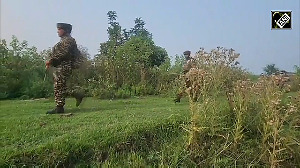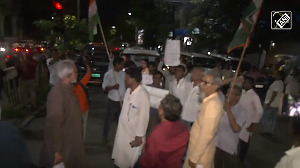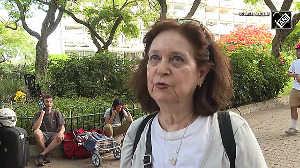Investigating agencies told rediff.com that although it is beyond doubt that the Pakistan army was involved in the attack, the major general could be a Lashkar-e-Tayiba operative.
Sources said that after conducting further investigations they managed to narrow it down to two men and information currently available does not indicate that the major general who was being referred to in the chargesheet was an army man. However, the police are not letting out the names of the two men.
The needle of suspicion was initially on Major General Muhammad Khalid Rao, a corps of signals officer. However as of now the probe has not found anything concrete against him.
Pakistan too had denied any links of the army in the 26/11 attack. Pakistan had stated that the IP addresses of the SCO were misused and hence this link cropped up.
Experts however said that Pakistan cannot completely rule out an army link. The call records make it clear that Colonel Sadatullah was involved and if there was no concrete proof, the Mumbai police would not have named him at all.
Experts also feel the need to probe deeper into the role played by the Special Services Group, an elite Pakistan navy wing. An operation on the sea could not have been conducted without the help of the SSG, experts also point out.
The question is whether the Mumbai police can continue to dig deeper once the chargesheet is filed.
Legal experts say that the Mumbai case falls under the classification of an exceptional circumstance and hence the courts will take a lenient view and allow the police to file an additional chargesheet.
Although there is no provision prescribed in the Code of Criminal Procedure, courts have observed that an additional chargesheet can be filed in exceptional cases.
This would mean that the Mumbai police will add more information, if they have any, once the trial commences.





